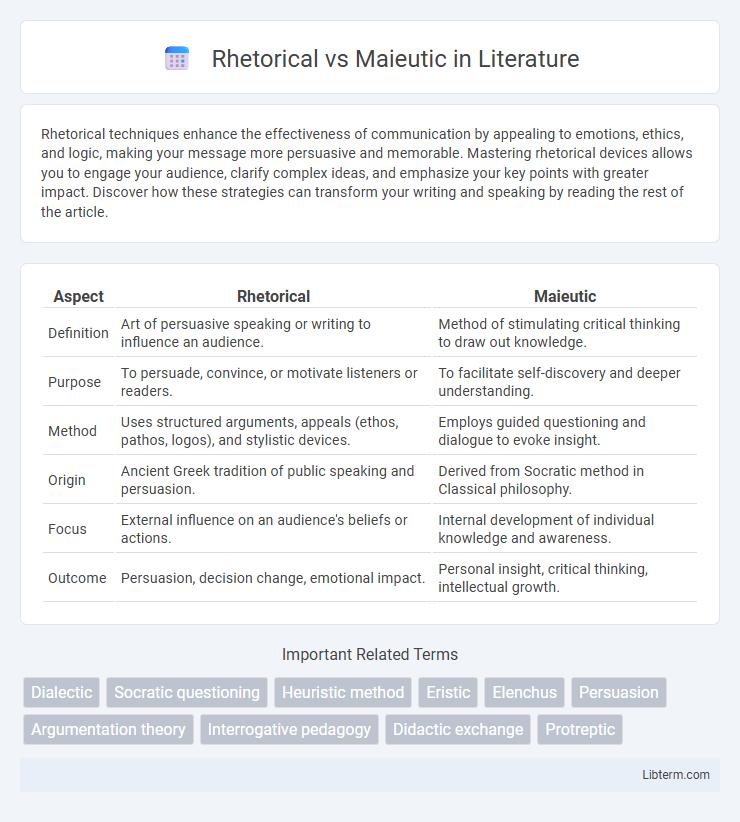Rhetorical techniques enhance the effectiveness of communication by appealing to emotions, ethics, and logic, making your message more persuasive and memorable. Mastering rhetorical devices allows you to engage your audience, clarify complex ideas, and emphasize your key points with greater impact. Discover how these strategies can transform your writing and speaking by reading the rest of the article.
Table of Comparison
| Aspect | Rhetorical | Maieutic |
|---|---|---|
| Definition | Art of persuasive speaking or writing to influence an audience. | Method of stimulating critical thinking to draw out knowledge. |
| Purpose | To persuade, convince, or motivate listeners or readers. | To facilitate self-discovery and deeper understanding. |
| Method | Uses structured arguments, appeals (ethos, pathos, logos), and stylistic devices. | Employs guided questioning and dialogue to evoke insight. |
| Origin | Ancient Greek tradition of public speaking and persuasion. | Derived from Socratic method in Classical philosophy. |
| Focus | External influence on an audience's beliefs or actions. | Internal development of individual knowledge and awareness. |
| Outcome | Persuasion, decision change, emotional impact. | Personal insight, critical thinking, intellectual growth. |
Understanding Rhetorical and Maieutic Approaches
The rhetorical approach emphasizes persuasion and effective communication through structured argumentation and stylistic techniques, aiming to influence audiences and clarify ideas. In contrast, the maieutic approach, rooted in Socratic dialogue, seeks to draw out knowledge through questioning, fostering critical thinking and self-discovery. Understanding these approaches involves recognizing rhetoric's focus on expression and persuasion versus maieutics' emphasis on eliciting latent knowledge through dialectical methods.
Historical Origins of Rhetoric and Maieutics
Rhetoric originated in ancient Greece, primarily developed by sophists like Corax and Tisias in the 5th century BCE, focusing on persuasion through effective speech. Maieutics, attributed to Socrates during the same era, emphasizes eliciting knowledge through strategic questioning, reflecting a method of intellectual midwifery. Both practices shaped classical education, with rhetoric advancing public discourse and maieutics fostering critical thinking and self-awareness.
Defining Rhetorical Techniques
Rhetorical techniques encompass strategies such as ethos, pathos, and logos designed to persuade or influence an audience by appealing to ethics, emotions, and logic. These methods emphasize structured argumentation, stylistic devices, and effective public speaking to shape perception and motivate action. Unlike maieutic approaches that draw out knowledge through questioning, rhetorical techniques assert and reinforce ideas to achieve impact.
The Socratic Method and Maieutic Questioning
The Socratic Method employs rhetorical questioning to stimulate critical thinking and illuminate underlying beliefs by posing probing, often challenging questions. Maieutic questioning, rooted in Socratic philosophy, focuses on drawing out knowledge that is latent within the respondent through guided, reflective inquiry. Both techniques prioritize dialogue and self-discovery, but maieutic questioning emphasizes nurturing innate understanding rather than exposing contradictions through debate.
Key Differences between Rhetorical and Maieutic Methods
Rhetorical methods emphasize persuasion through structured argumentation, appealing primarily to ethos, pathos, and logos to influence an audience's beliefs or actions. Maieutic methods prioritize eliciting knowledge through guided questioning, encouraging individuals to discover truth internally by refining their own ideas. The key difference lies in rhetorical techniques aiming to convince externally, while maieutic strategies facilitate self-awareness and intellectual insight from within.
Rhetorical Strategies in Persuasion
Rhetorical strategies in persuasion employ techniques such as ethos, pathos, and logos to influence audiences by appealing to credibility, emotion, and logic. These strategies are designed to structure arguments that captivate and convince, often using repetition, metaphor, and rhetorical questions to strengthen the speaker's position. Unlike Maieutic methods that prioritize eliciting ideas through dialogue, rhetorical approaches focus on crafting deliberate messages to shape beliefs and motivate action.
Maieutic Dialogue in Philosophical Inquiry
Maieutic dialogue in philosophical inquiry functions as a method of eliciting knowledge through guided questioning, enabling individuals to uncover truths inherently present within their own reasoning. This approach contrasts with rhetorical methods that often aim to persuade or assert authority, as maieutic dialogue fosters critical thinking and self-reflection by facilitating an internal discovery process. Philosophers like Socrates utilized maieutic dialogue to challenge assumptions and prompt deeper understanding, emphasizing the dynamic interaction between interlocutors to co-construct meaning and insight.
Practical Uses of Rhetoric in Modern Communication
Rhetoric plays a crucial role in modern communication by enhancing persuasive skills in advertising, political speeches, and social media campaigns, where effective message delivery influences public opinion and consumer behavior. Unlike maieutic methods that prioritize eliciting ideas through questioning, rhetoric focuses on structured argumentation, emotional appeal, and clarity to achieve desired responses from audiences. Mastering rhetorical techniques enables professionals to craft compelling narratives that drive engagement and decision-making across diverse digital and interpersonal platforms.
Applications of Maieutics in Education and Counseling
Maieutics, rooted in Socratic questioning, is widely applied in education and counseling to facilitate self-discovery and critical thinking, encouraging learners and clients to articulate and refine their own ideas. In educational settings, maieutic methods promote active learning by engaging students in dialogue that uncovers underlying assumptions and deeper understanding, enhancing problem-solving skills. In counseling, maieutic techniques support clients in recognizing internal conflicts and fostering personal insight, leading to more effective decision-making and emotional growth.
Choosing the Right Approach: Rhetoric vs Maieutic
Choosing the right approach between rhetoric and maieutic hinges on your communication goals: rhetoric emphasizes persuasive speaking and structured argument to influence an audience, while maieutic centers on eliciting knowledge and insight through guided questioning. Professionals aiming to inform or motivate decisions often prefer rhetorical methods, leveraging ethos, pathos, and logos to construct compelling narratives. Conversely, educators and facilitators employ the maieutic approach to foster critical thinking and self-discovery by encouraging interlocutors to articulate and refine their ideas.
Rhetorical Infographic

 libterm.com
libterm.com